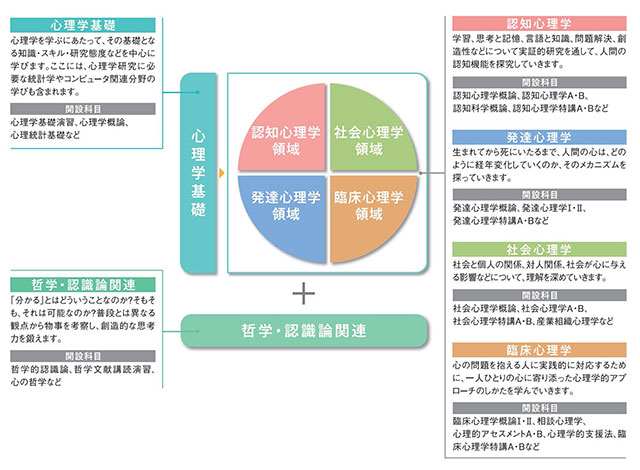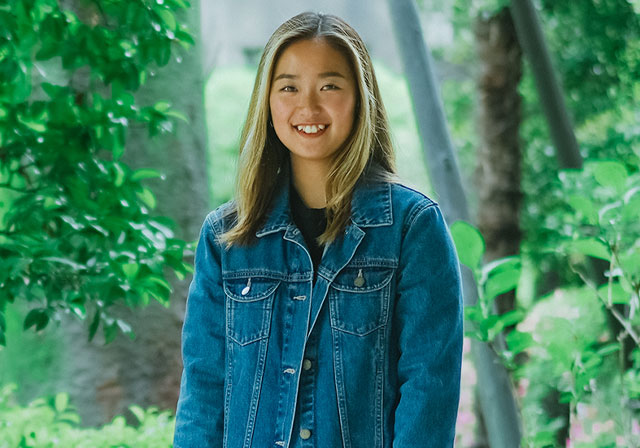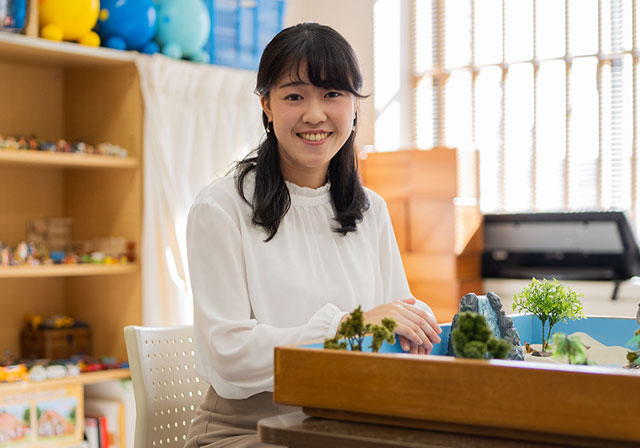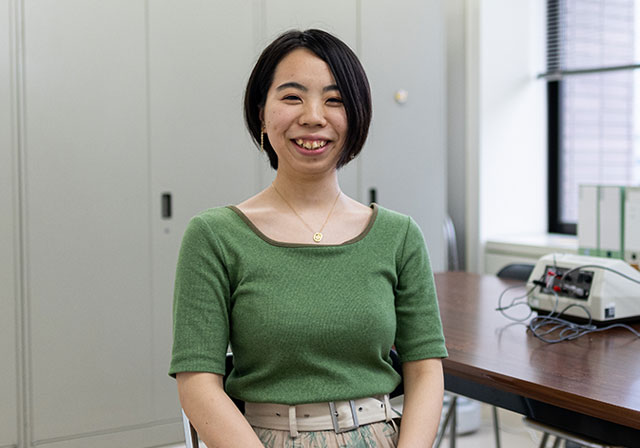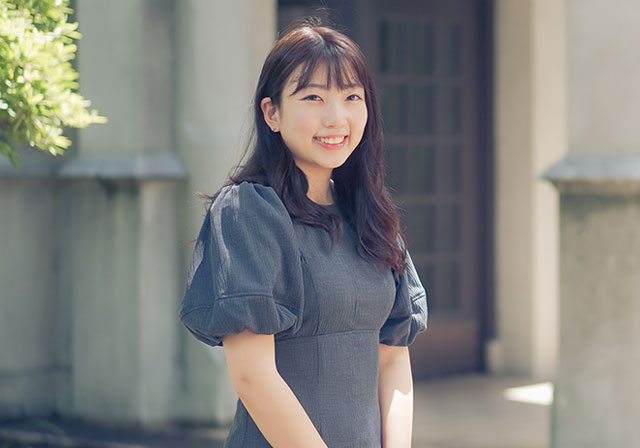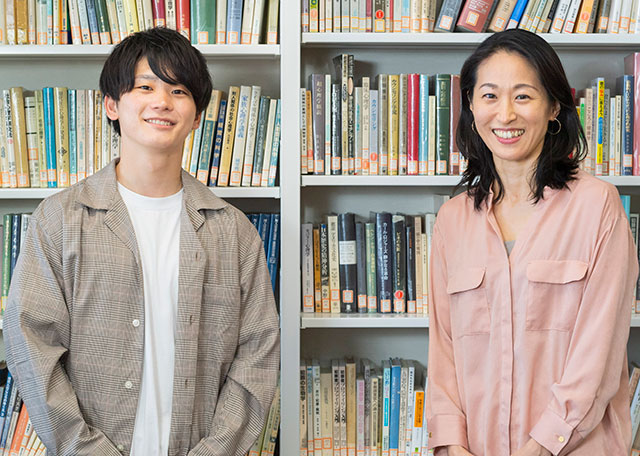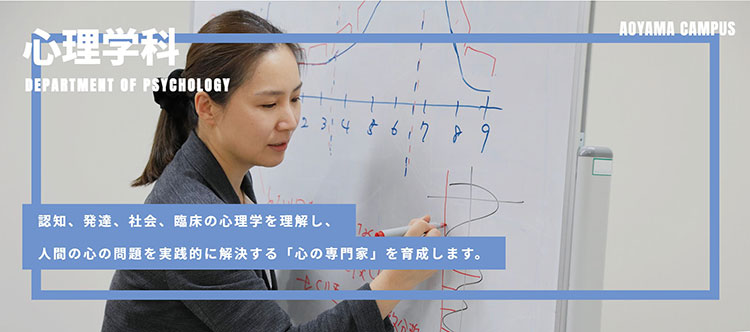Learn about "human beings" more comprehensively
Aoyama Gakuin University
What is Department of Psychology?
A wide range of learning, from basic psychology to clinical psychology, with a high level of expertise
Psychology is a scientific study of the invisible movements of the mind. Our university has over 60 years of experience in graduate school psychology research, and Department of Psychology Department of Psychology established in 2001. We will introduce you to psychology research, which continues to evolve, the appeal of psychology itself, the features of studying at our university, and how to obtain qualifications.
 Characteristics of the Department of Psychology College of Education, Psychology and Human Studies
Characteristics of the Department of Psychology College of Education, Psychology and Human Studies
Professor, Department Department of Psychology, College of Education, Psychology and Human Studies, Chief Department of Psychology
Kazuyoshi Omata
Since 1990, he has been involved in clinical practice, including full-time psychiatric clinical work and part-time counseling at the University Student Counseling Center, before joining Aoyama Gakuin University in 2001. After working as a full-time lecturer and associate professor, he has held his current position since 2011. Since 2009, he has been involved in clinical work in the judicial and criminal fields as a lecturer at training sessions for family court investigators. In 2011, he became a member of the steering committee of the Psychological Support Center for the Great East Japan Earthquake, and has been involved in psychological support activities in the disaster-stricken prefecture of Miyagi. He then served on the Disaster Support Project Team of the Japanese Association of Clinical Psychologists, and is now a member of the Business Support Committee. At Aoyama Gakuin University, he currently serves as the Chief Department of Psychology, General Manager the Psychological Counseling Office, and Convener of the Graduate School Certified Psychologist Training Program.
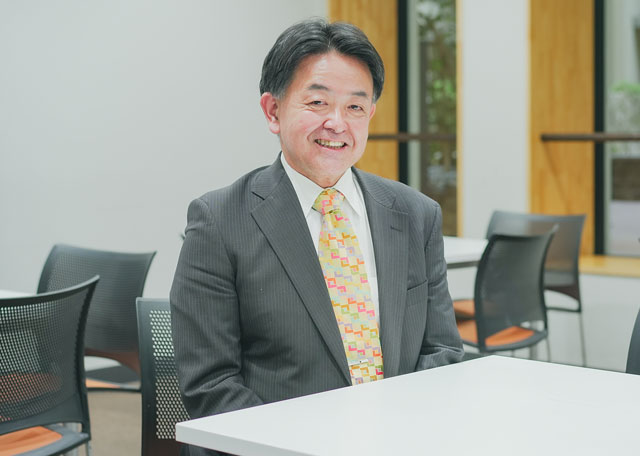
■ What is psychology?
Psychology is a study that observes the human mind from various angles and learns many things from its behavior and phenomena. Psychology spans many fields, but each field offers deep learning opportunities and is packed with important knowledge for living in society.
For example, psychology in general helps us understand others, which is useful for everyday communication. Additionally, "cognitive psychology," which delves into the senses of vision and hearing, is useful in product development and design work. "Social psychology" covers everything from the microscopic perspective of interpersonal attraction to the macroscopic perspective of the mechanisms by which rumors spread. "Developmental psychology" studies the psychological issues that arise at each stage of a person's life. Furthermore, "clinical psychology" explores support such as mental care and problem solving. Psychology can also be a powerful tool in providing psychological support during crises such as large-scale disasters.
The starting point of psychology is the question "What is the mind?" Philosophy is the pursuit of that very question, while psychology is the attempt to put research results on the mind into practical use. To do this, it is necessary to express the mind, which is essentially invisible, in a form that can be objectively grasped. In basic fields such as cognitive psychology, scientific research using experiments and statistics has been carried out with the aim of establishing objective indicators for the mind. Therefore, by studying psychology, you can acquire objective thinking skills, information processing abilities, and even the presentation skills necessary for presenting research.
■ Features of this department
The feature of this department is that students can learn from basic knowledge to specialized knowledge in a wide range of fields, including practice, in a systematic way. In addition, we place importance on students' independent learning, and we offer seminars and specialized courses starting from the third year as a choice. Students first learn the basics through "Basic Psychology Exercises", and then choose their specialty from four specialized fields: "cognitive psychology", "social psychology", "developmental psychology", and "clinical psychology" according to their interests. At the same time, they improve their thinking skills through "philosophy and epistemology" related courses taught by specialized teachers. From the third year, students are divided into two courses: the "General Psychology Course", which allows students to choose their classes with a high degree of freedom, and the "Clinical Psychology Course", which aims to become a psychology professional, and they deepen their learning through seminars and other programs. The graduate school also has two courses, the "Psychology Course" and the "Clinical Psychology Course", so students can choose the course they want and further their research.
■ Clinical psychology emphasizes practice and supports the acquisition of professional qualifications
Another feature of our department is that it offers a wide range of learning opportunities, and also has a rich clinical field. Both the undergraduate and graduate programs offer a wide range of practical training programs, allowing students to gain practical experience. Furthermore, the graduate school's clinical psychology course offers a curriculum for training licensed psychologists and clinical psychologists, and we are fully prepared to support students in obtaining professional qualifications.
Of particular note is the clinical training at the university's facility, the "Psychological Counseling Room." Graduate students in the clinical psychology course actually provide psychological support to clients through counseling, play therapy, sandplay therapy, and other methods. During students' training, they receive detailed feedback through "supervision," an interview guidance provided by an outside expert, and conferences are also held by full-time clinical instructors (qualified individuals). Trainees also learn about collaboration and crisis response through roles such as reception work and journal publication.
I would like students studying psychology to acquire both "empathy and compassion for others" and "the ability to calmly analyze based on objective data." In particular, I would like students aiming to become psychologists to be conscious of "the ability to be prepared and responsible in order to interact with clients who are sometimes hurting."
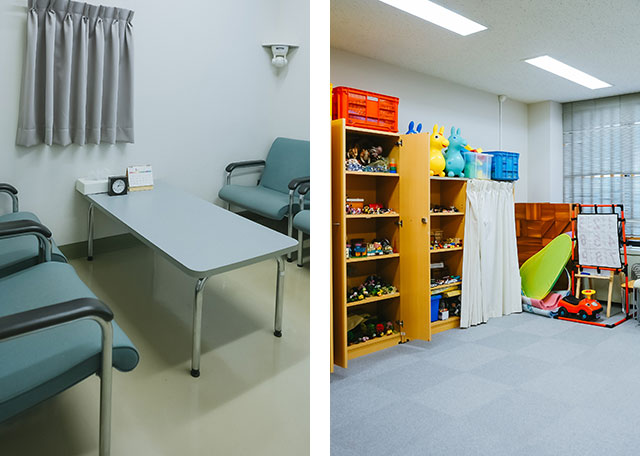 The "Psychological Counseling Room" is attached to Graduate School of Education, Psychology and Human Studies. As an institution that provides psychological support to those outside the university, it plays a role rooted in the local community and also serves as a training institution for undergraduate and graduate students studying clinical psychology. It is registered with the Ministry of Health, Labor and Welfare.
The "Psychological Counseling Room" is attached to Graduate School of Education, Psychology and Human Studies. As an institution that provides psychological support to those outside the university, it plays a role rooted in the local community and also serves as a training institution for undergraduate and graduate students studying clinical psychology. It is registered with the Ministry of Health, Labor and Welfare.※Our graduate school master's course (clinical psychology course) is approved as a first-class designated graduate school by the Japan Clinical Psychologist Certification Association, a public interest incorporated foundation. Psychological Counseling RoomVIEWDETAIL →
■ Conclusion
The things and phenomena we perceive on a daily basis are just the tip of the iceberg of all things, and there is much more that lies beneath them. I feel that the act of searching for these things is what "psychology" is all about. Students, please enjoy learning. If you keep challenging yourself without fear of failure, you will find treasures. Also, actively gain experience and value connections with others. In our department, we actively promote exchanges between students and faculty, including the student-centered "Aoyama Psychological Society." Through your studies in this department, you will hone your compassion and caring for others.

Qualifications for psychological professionals *For details on each qualification, please check the official website of each organizer.
■ Certified psychologist
This is a private qualification recognized by the Japanese Psychological Association, and requires completion of the required number of credits at university. It shows that the holder has learned psychology in general and has the basic knowledge necessary to work as a psychology professional.
■ Certified Psychologist
The only national qualification in Japan for a psychological professional.
After graduating from a university with a licensed psychologist curriculum, one can obtain the qualification by taking the necessary courses at a graduate school with a designated curriculum, or by gaining more than two years of practical experience and passing the national examination. Licensed psychologists are professionals who use psychological knowledge and techniques to provide assistance to people with mental problems. They provide counseling to clients, analyze their problems, and lead them to problem-solving through advice and guidance. Another important role of licensed psychologists is to carry out educational activities and provide information to spread knowledge about mental health.
■ Clinical psychologist
It is a private qualification certified by the Japan Clinical Psychologist Certification Association, a public interest incorporated foundation, but is also officially recognized as a qualification adopted by the Ministry of Education, Culture, Sports, Science and Technology as a qualification requirement for school counselors. Qualification can be obtained by graduating from a four-year university, completing a graduate school designated by the association, and passing the Clinical Psychologist Examination. Our university's graduate school Master's program (Clinical Psychology course) is Type 1 designated by the Japan Clinical Psychologist Certification Association, a public interest incorporated foundation, which allows students to become eligible to take the clinical psychologist exam without having to gain practical experience after graduation.
 Current Student Interview
Current Student Interview
Through both university studies and extracurricular activities,
Want to reduce child abuse?
College of Education, Psychology and Human Studies Department of Psychology Clinical Psychology Course, 4th year
Sayako Seki
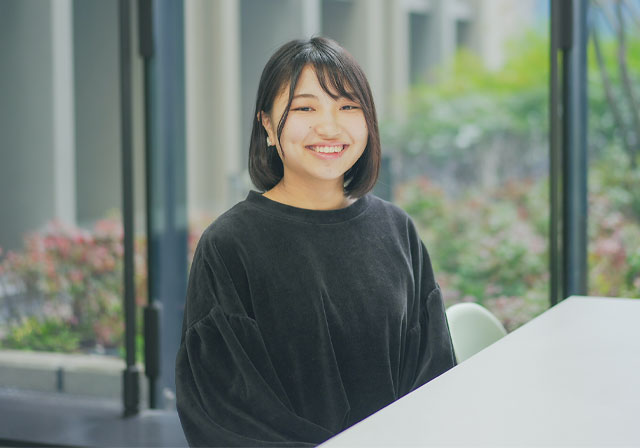
I became interested in psychology after learning about child abuse through the news. Wanting to reduce abuse even a little, I continued to research various topics and came across Professor Omata, who is researching a method called "Parallel Interviews between Parents and Children by the Same Therapist" at our university. Wanting to study under Professor Omata, I entered Department of Psychology at our university. After enrolling, I learned about psychology in a wide range of areas, and from my third year I have been conducting research in Professor Omata's seminar, with a focus on "family psychology."
As for off-campus activities, there is "Open, PEACE!" This is a volunteer group that I started in my second year, and even now students from Department of Psychology at our university continue to be active as members. The theme of "Open, PEACE!" is "Social experience for children, free time for parents." By taking care of children, we aim to provide parents with time to relax and heal, and to create a world where both parents and children can live happily.

With the cooperation of parents who participated in the "Open, PEACE!" event, we are conducting research at the university aimed at preventing child abuse. In the third year of research, it was revealed that a "psychological place to belong" reduces stress responses. In the fourth year, we plan to conduct research on whether temporary relief from the role of parent in a third place (a third place other than home, school, or work) improves the mental health of parents. If we can scientifically prove that third places are effective as psychological places to belong, we thought that the spread of third places, which are places where parents can be temporarily relieved from their roles as parents and at work, would be more persuasive when promoting them as one of the measures to prevent child abuse. Most previous research on "psychological places to belong" has focused on people up to university age. Because I am conscious of the child-rearing generation, I continue to conduct research on people aged 25 to 40.
After graduating from university, I plan to go on to graduate school and obtain qualifications as a licensed psychologist and clinical psychologist. In the future, I would like to incorporate the perspective of "family therapy" into the fields of education and welfare, and provide support to families as a qualified professional.
Taking advantage of the "family" perspective,
After graduation, I want to work in a psychological position where I can see things from the client's perspective.
Graduated from the Clinical Psychology Course in the Department Department of Psychology College of Education, Psychology and Human Studies
Graduate Graduate School of Education, Psychology and Human Studies Department of Psychology Clinical Psychology Course, Master's Program, 2nd year
Aoi Taga
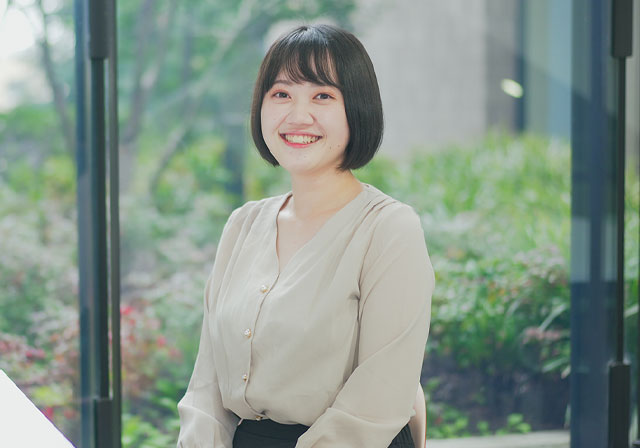
The "mind" is a fluid thing. I find it most enjoyable to think about how to understand the ever-changing "mind" through psychology. On the other hand, learning about common human elements such as perception and development can be useful for yourself and your loved ones.
I applied to this university because I felt the prospects for obtaining qualifications as a psychologist were clear. Another attractive point was that I could study a wide range of psychology. I became interested in the psychology profession when I learned about school counselors in junior high school. There are many professions that relate to the "mind," including psychiatry, but I find the psychology profession particularly attractive because it allows me to sit down and listen to my clients.

At university, I conducted research on "mother-child relationships in the university generation" from the perspective of "the impact on children's independence." Currently, my research is centered on "looking back at my own family." Japanese families are often nuclear and are said to be closed off, and I am focusing on the emotional movements of people who are troubled or suffering from the nature of Japanese families. Family is the first "other" we meet after we are born, and it is a special existence with which we continue to be involved for a long time. Therefore, looking back on your family during your student years, just before entering society, may lead you to think about your own future.
During my graduate studies, I especially learned a lot from my training in the "psychological counseling room." At times, I would feel anxious about not being able to give good advice to my clients as a counselor, but through daily practice and guidance from my teachers, I gradually came to think that "the most important thing is to see things from the client's perspective and think together."
After graduating, I hope to work in the medical field as a qualified professional. I would like to become a psychologist who can help people think about their mental health issues and how they can live richer lives.
 Alumni and Graduate Interviews
Alumni and Graduate Interviews
Enrich your life through a wide range of psychology studies.
Currently providing support at a children's home.
Work at a child welfare facility
Graduated from the Department Department of Psychology College of Education, Psychology and Human Studies
Graduate School Graduate School of Education, Psychology and Human Studies Department of Psychology Master's degree in Clinical Psychology

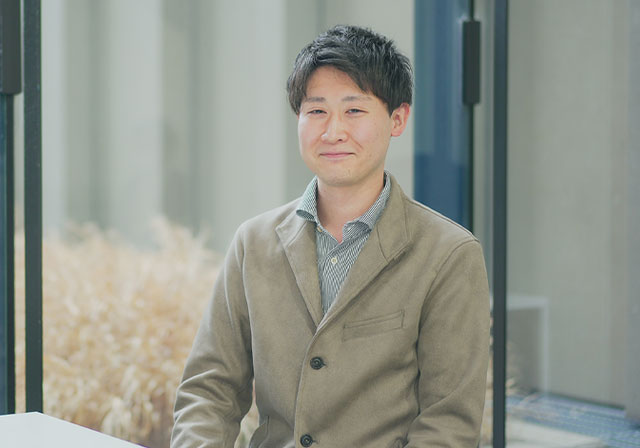
I think one of the attractions of psychology is that it allows you to explore anything related to "people," from everyday questions to complex questions. Also, psychology does not often provide clear answers, so I find it interesting that you have to keep thinking. Another attraction of psychology is that you can learn research methodology through experiments and statistics.
I first became interested in psychology when I saw it in the news and wondered, "Where is the difference between normal and abnormal?" I applied to this university because I thought Department of Psychology 's rich curriculum would provide me with clues to answer such questions. After enrolling, my interests broadened through the many classes I took, and my interest in "clinical psychology" grew. In the Omata seminar, which I joined in my third year of undergraduate studies, I researched "irrational beliefs," which are rigid ways of thinking such as "it should be this way."

In graduate school, I undertook many practical trainings, including the Certified Psychologist curriculum, including one at the workplace of an alumnus of our university. I think the biggest thing I learned through the training was how to respect and strive to understand the person in front of me who I am supporting as a person. In particular, during my training as a counselor in the "Psychological Counseling Room," I am truly grateful to the clients who were willing to face me as a student. My work experience, such as answering the phone and holding training sessions, also provided practical learning for the workplace.
Currently, I work with children as a medical instructor at a child welfare facility, while also providing logistical support to care workers. In the field, I feel the importance and difficulty of adapting the knowledge I learned at university to the actual situation and working with people in other professions. I also attend training sessions and other self-study, and I continue to study every day.
I feel that studying psychology has enriched my way of life. It has expanded my areas of interest and concern, and when I have questions or am in trouble, it can provide me with an opportunity to solve the problem. I believe that the knowledge gained from the wide-ranging study of psychology can provide us with many hints.
Becoming a psychological professional to support children and their parents.
Supported by knowledge from psychology
Ai no Sono Fuchinobe Kindergarten Licensed Psychologist, Clinical Psychologist
Graduated from the Department Department of Psychology College of Education, Psychology and Human Studies
Graduate School Graduate School of Education, Psychology and Human Studies Department of Psychology Master's degree in Clinical Psychology
Nagisa Yokoo
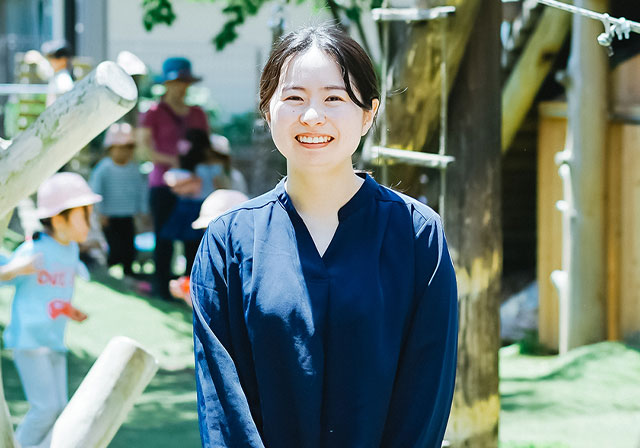
Yokoo's desire to "support children" grew stronger, and she eventually decided to aim to become a psychological professional. She currently works as a "certified psychologist" at a certified early childhood education and care facility that provides inclusive childcare. We spoke to her about what she learned in Department of Psychology, the changes that have occurred in her life, and her current job.
VIEW DETAILS →Current Student Interview (AGU LiFE)
Balancing academics and athletics gives me confidence.
Psychology and surfing: Aiming to become a professional in both
<2021 and 2022 Student Award Winners>
2nd year, Department of Psychology College of Education, Psychology and Human Studies
Sawada Nanao
Sawada, who is active as a top-level surfer in Japan, became interested in the mechanisms of the mind through his own experiences. He is pursuing his two dreams of becoming a professional surfer and a licensed psychologist while exploring the psychology of athletes and striving to improve their athletic performance.
VIEW DETAILS →While studying hard,
Searching for ways to support people who have suffered emotional wounds
<2022 Academic Excellence Award Encouragement Award Winner>
4th year, Department of Psychology College of Education, Psychology and Human Studies
Junko Shimura
Wanting to help people who have suffered emotional pain for some reason, Shimura enrolled in Department of Psychology at our university to learn about the "psychology" from various angles. She is currently studying hard every day with the goal of obtaining the national qualification of a licensed psychologist.
VIEW DETAILS →With an unchanging desire to help others
Chasing the dream of becoming a psychologist
3rd year, Department of Psychology College of Education, Psychology and Human Studies
Maina Yoshida
Based on her own experience studying for entrance exams, Yoshida-san decided to study Department of Psychology because she wanted to learn more about the relationship between the mind and body and ways to deal with stress. Her goal is to become a licensed psychologist who can provide support to those in need.
VIEW DETAILS →I continued to work on it until I was satisfied with it just the way it is.
job hunting
4th year, Department of Psychology College of Education, Psychology and Human Studies
Nanako Morishita
Morishita, who was interested in human emotions, aspired to study psychology and chose Aoyama Gakuin University, where he could study a broader range of subjects than other universities. This is the story of Morishita, who stepped up in four years and got a job offer at an advertising agency.
VIEW DETAILS →Seminar Interview (AGU LiFE)
Social psychology, interpersonal communication
Faculty of Education and Human Sciences Department of Psychology
Associate Professor Egishi Shigemasu × Mio Yasuo
In Shigemasu's seminar, which focuses on communication, students are active in discussions. They are also interested in the research of other students and actively broaden their horizons. We will introduce the research being done in the seminar and the fun of learning in the seminar.
VIEW DETAILS →*The years of employment, Position, activities, etc. of the people featured are, in principle, those at the time of the interview, unless otherwise noted.
Department of Psychology 20th Anniversary Event
On Sunday, March 12, 2023, the Aoyama Gakuin University Department of Psychology 20th Anniversary Celebration and Alumni Reunion was held under the theme of "Meet your future self. Tell us about yourself back then." The main event, a symposium, was themed "20 years of progress in the Department Department of Psychology Department of Psychology, and into the future," and included stories about Department of Psychology from faculty and Department of Psychology, including how the Department was established and its vision for the future. Afterwards, there was a quiz hosted by faculty and alumni, and an introduction of retiring faculty members. At the end, a commemorative photo was taken, and the event, which attracted 250 participants, was a great success.
VIEW DETAILS →